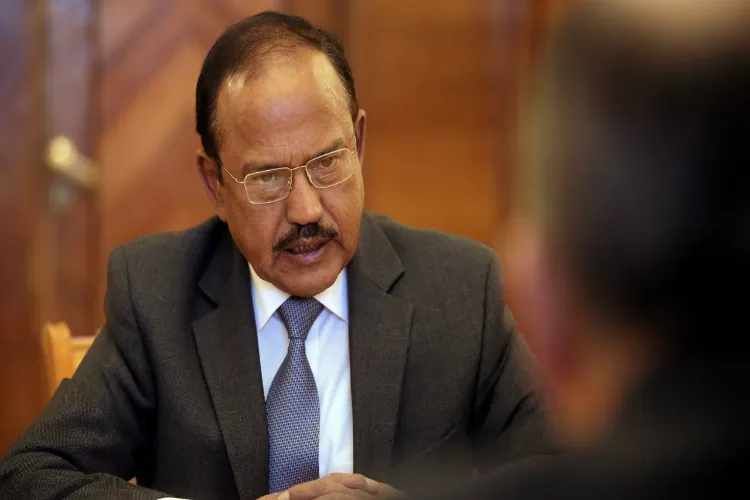
Ram Kumar Kaushik/New Delhi
In the shifting sands of Indian Subcontinent geopolitics, India’s national security landscape has been dramatically reshaped by a doctrine rooted in clarity, audacity, and strategic foresight—Ajit Doval’s Offensive Defence. As National Security Advisor (NSA), Doval has executed the uncompromising security vision of Prime Minister Narendra Modi with missionary zeal ever since he joined the Prime Minister’s Office in 2014. This doctrine has not only recalibrated India’s counter-terrorism posture from passive defence to proactive deterrence but has also demonstrated its effectiveness repeatedly on the ground.
The recent success of Operation Sindoor, launched in response to the Pahalgam terror attack, marks a definitive moment. Nine terror camps across the border were dismantled through precision drone and missile strikes, eliminating key leadership and infrastructure. It was not just a military operation—it was a geopolitical message. Within days, Pakistan, facing untenable costs, extended a ceasefire proposal.
Behind this sharp shift is not only Doval’s strategic brilliance but also the decisive and unflinching political backing he receives from PM Modi. Geopolitical analysts widely agree: it is Modi’s unwavering trust and support that has enabled Doval to hit uphill targets others would hesitate to attempt. The Prime Minister’s soaring popularity at home and rising global stature have only bolstered India’s leverage in such high-stakes engagements.
The Core of Offensive Defence
At its heart, Doval’s doctrine is rooted in proactive preemption. No longer willing to wait for terror to strike within its borders, India now strikes at the roots of terrorism, often beyond its own territory. This shift was first showcased during the 2016 Uri Surgical Strikes, which targeted launch pads across the Line of Control. It matured with the 2019 Balakot Air Strikes, where India bombed Jaish-e-Mohammed’s training facility deep in Pakistan’s Khyber Pakhtunkhwa province.
Operation Sindoor (2025) is the latest evolution of this strategy. Leveraging drone swarms and long-range precision-guided munitions, India’s armed forces decapitated terror leadership and infrastructure with minimal collateral damage. As one defence analyst observed: “Doval’s clarity ensured unprecedented intelligence synergy and precision in Operation Sindoor.”
Another key tenet is strategic cost-imposition—India subtly supports internal movements like the Baloch resistance and capitalises on Pakistan’s economic vulnerabilities through diplomatic and informational warfare. This, coupled with controlled escalation, ensures India acts decisively while staying below nuclear red lines.
In Doval’s own words: “Defensive offence is when you attack the place where the offense originates… Once adversaries understand this shift, it becomes unaffordable for them.”
The Record of Effectiveness
The doctrine’s operational success is evident in hard numbers and strategic outcomes. After the Uri strikes, infiltration incidents along the LoC dropped by 60%. Balakot shattered Pakistan’s myth of nuclear impunity. Sindoor, with its seamless execution, destroyed nine terror hubs and killed multiple high-value targets—without drawing international condemnation.
Notably, Doval’s strategy also embraces hybrid and fourth-generation warfare: cyber operations, intelligence-driven targeting, satellite surveillance, and advanced drone capabilities. These enable India to strike with precision and deniability when needed.
Technology, Diplomacy, and Global Acceptance
India’s enhanced military capability has been a critical enabler. Technologies like the Spice-2000 precision bombs and real-time drone ISR (intelligence, surveillance, reconnaissance) systems have made surgical strikes far more accurate and sustainable. During Operation Sindoor, real-time intelligence-sharing partnerships with the US, Israel, UAE, France, and Russia allowed India to act swiftly and surgically.
Simultaneously, India has leveraged its growing diplomatic weight to justify its actions. At the UN Security Council, India has consistently presented compelling evidence of Pakistani complicity in cross-border terrorism, gaining tacit endorsement from major powers. Increasingly, global norms have tilted toward recognising anticipatory self-defence as legitimate—a significant win for India’s security doctrine.
Reshaping South Asian Strategic Dynamics
The impact on regional stability is undeniable. Since the adoption of offensive defence, Pakistan has faced mounting diplomatic isolation and internal dissent. Cross-border terror attempts have declined, and Pakistan’s traditional leverage through asymmetric warfare is diminishing.
A senior security analyst summed it up: “Doval’s doctrine significantly altered South Asia’s strategic calculus, imposing unsustainable costs on terrorism sponsors.”
The doctrine has also drawn comparisons with Israel’s proactive counter-terrorism strategy and the U.S. post-9/11 doctrine—though India’s version is calibrated to prevent long-term entanglement or uncontrolled escalation. Strategic communications with powers like the US and China during operations ensure that military actions do not spiral into conventional or nuclear conflicts.
A Lasting Legacy
Ajit Doval’s offensive defence strategy is no longer just a doctrine; it is the backbone of India’s contemporary national security architecture. It signals a new era where India is not merely reactive, but assertively shapes its own security environment.
As India looks ahead, Operation Sindoor will likely serve as a case study in how calculated, intelligence-led preemptive action can deter state-sponsored terror more effectively than conventional diplomacy or passive defence.
READ MORE: PM Modi visits Adampur Airbase, interacts with Air warriors
In the words of a strategic affairs expert: “The enemy now finds it prohibitively costly to engage in asymmetric warfare against India. Doval’s strategy has decisively proven its effectiveness.”
